Our continuing research into the pro-Russian propaganda media network in Europe has revealed an emerging and surprisingly powerful player in Slovenia—Insajder.com.
After the EU banned Russian state media such as RT, Sputnik, and RIA Novosti, the Kremlin’s disinformation machine found new life through local proxies. The Slovenian website Insajder.com stands as a striking example of how a seemingly domestic “alternative media” outlet can adopt, amplify, and normalize Russian propaganda — gaining mass popularity and replacing banned state outlets within the EU’s own information space.
A Rising Player in the Kremlin’s Disinformation Network
Despite Slovenia not being a priority target for the Kremlin’s hybrid operations, this website has become one of the most viewed propaganda platforms in the country, spreading manipulative, sensationalist, and anti-Western, anti-Ukraine content under the guise of “alternative news.”
While EU sanctions banned Russian state outlets such as RT, Sputnik, and RIA Novosti, Moscow’s disinformation machine quickly adapted and upgraded. It now operates through local, Kremlin-friendly media, influencers, and so-called “alternative information” portals. Insajder is a textbook example of how this strategy works in practice. (See also Slovenian Media That Disseminate Russian Propaganda).
Propaganda Masquerading as News Reports
Insajder.com presents itself as a neutral and patriotic Slovenian news source. In reality, it systematically recycles Kremlin propaganda, glorifies Russia’s invasion of Ukraine, and vilifies Western leaders.
The site’s visual content is particularly aggressive: European Commission President Ursula von der Leyen is depicted as a Nazi, her face merged with Hitler’s and placed against an EU flag bearing swastikas. French President Emmanuel Macron is mocked as a clown, while a montage shows von der Leyen, Macron, and Ukraine’s President Volodymyr Zelenskyy as waiters serving Trump, Putin, and Hungary’s Viktor Orbán.
These graphics are more than parody—they are a deliberate form of visual disinformation, designed to provoke outrage, ridicule democratic leaders, and desensitize audiences to Russia’s aggression.
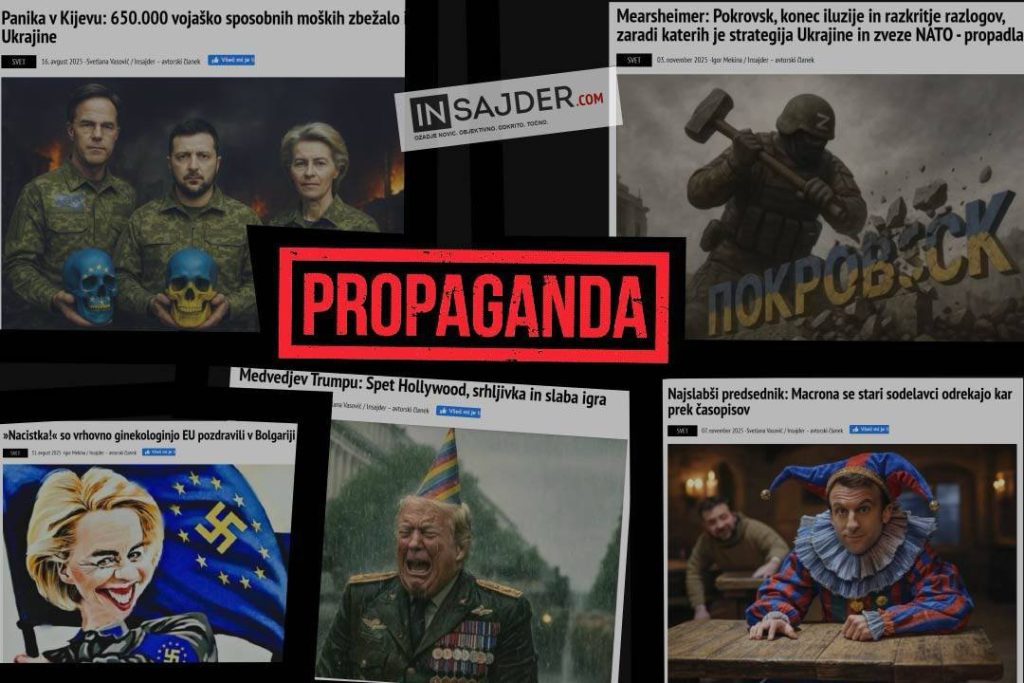
Glorifying Russia’s War and Mocking Ukraine
Dozens of Insajder articles justify Russia’s full-scale war against Ukraine, often presenting Russian soldiers as “liberators” and celebrating their battlefield advances, including coverage of Russia’s offensive on Pokrovsk.
The website routinely accuses Ukraine’s leadership of corruption, echoes the Kremlin’s “denazification” narrative, and publishes manipulative claims suggesting that the West “provoked” the conflict.
This editorial line directly mirrors content from Russian state media, which Insajder frequently quotes or paraphrases.
Even the article structure and language match propaganda templates seen across RT, Sputnik, and RIA Novosti—using phrases like “Kyiv regime,” “liberated territories,” and “special military operation.”
How Propaganda Meets Popularity
One might assume that such blatant manipulation would fail to attract readers. Yet, the opposite is true.
According to SimilarWeb, Insajder experienced explosive growth in 2024–2025, reaching 1.6 million views between September and October 2025—a massive figure in a country of only 2.1 million people.

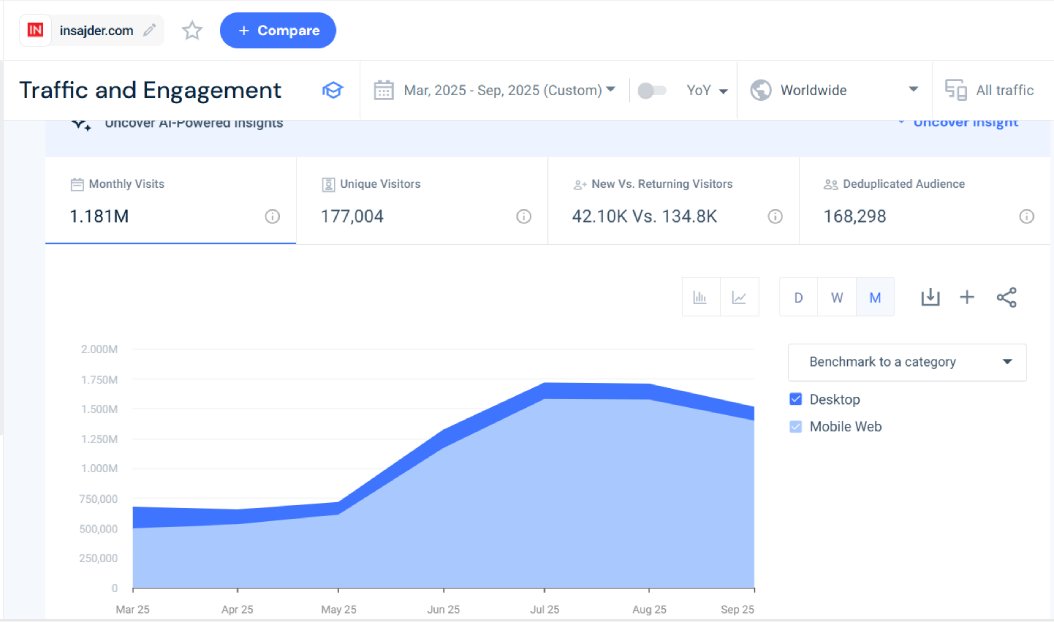
This means that Insajder’s audience equals half the readership of leading professional media outlets in Slovenia. The site’s success is not accidental—its editors use clickbait headlines, shocking imagery, and outrage-based framing to boost engagement and visibility.
More concerning is that 44% of its traffic comes from search engines, particularly Google, which ranks Insajder’s manipulative stories under common queries such as “Russian news” in Slovenian.
The site also draws traffic from Yandex, Russia’s largest search engine, and from si.contentexchange.me, a local content-sharing platform that further amplifies its reach.
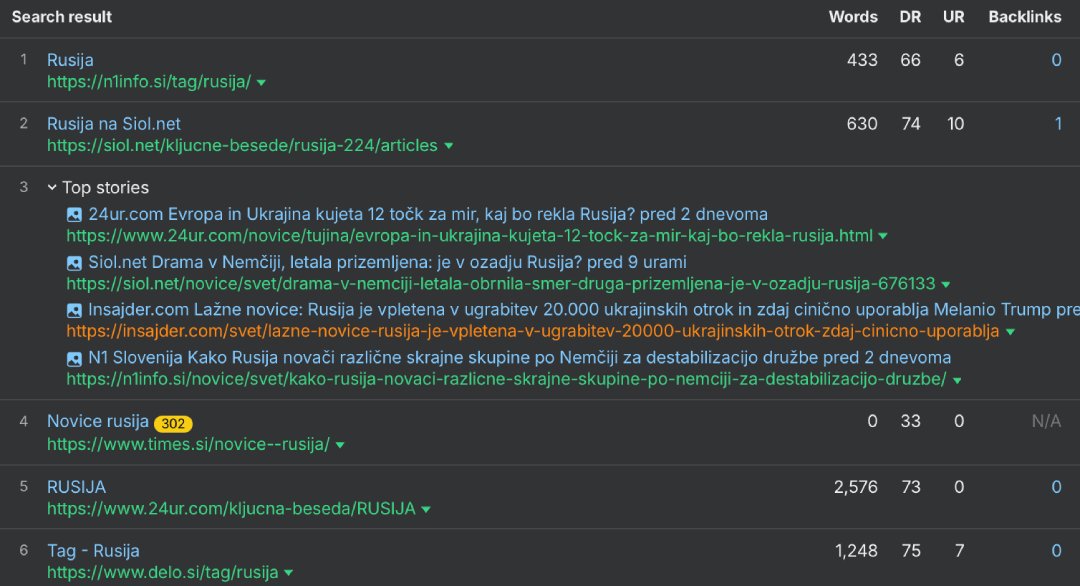
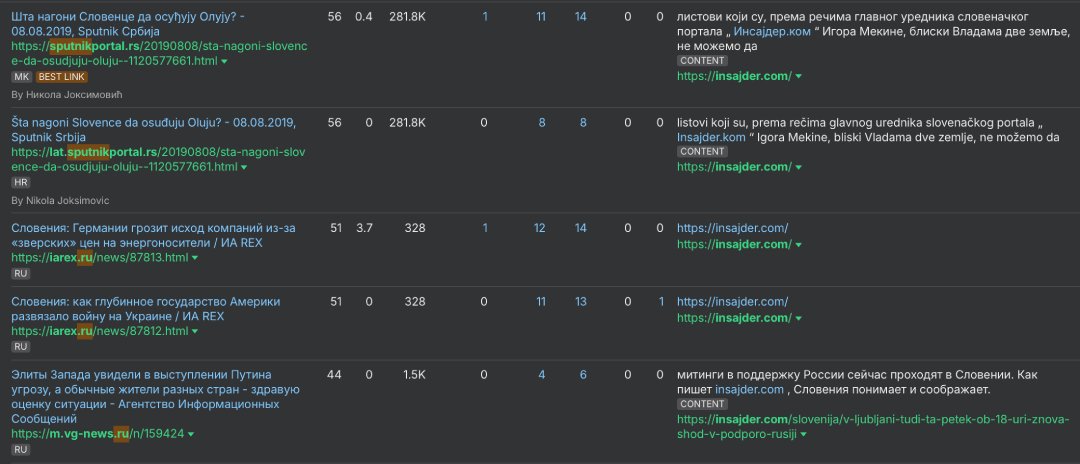
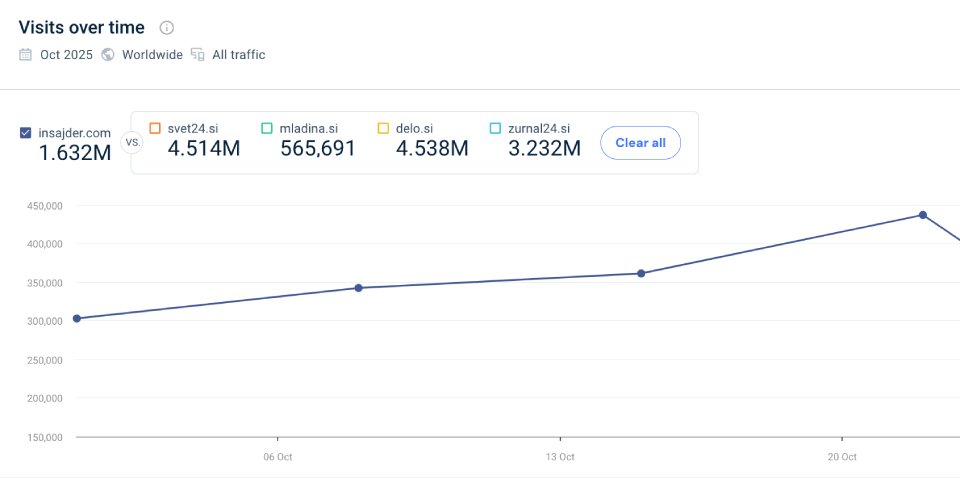
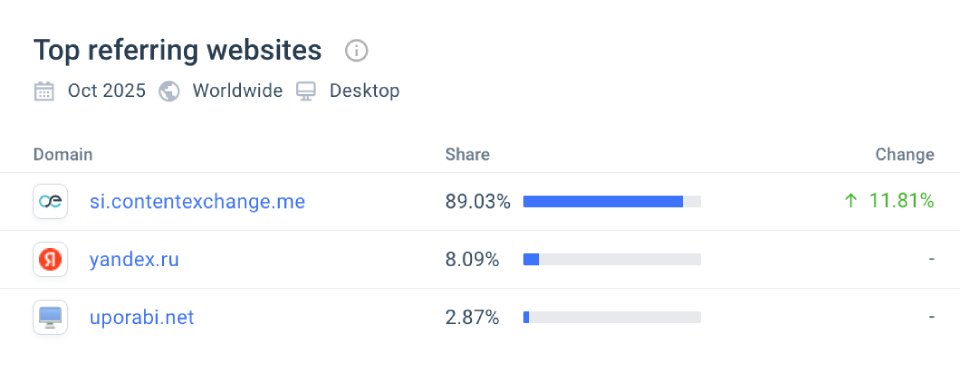
A Source for Moscow’s Disinformation Loop
Our link analysis shows a two-way propaganda flow between Insajder and Russian propaganda media.
- The Slovenian site quotes Russian sanctioned outlets, transmitting their disinformation to local audiences.
- In turn, Sputnik Serbia and Russian sites like Iarex cite Insajder as a “Slovenian source,” presenting its narratives as “the opinion of Slovenians.”
For example, Iarex published an article titled “Slovenian Media Explains How the American Deep State Started the War in Ukraine,” directly citing Insajder’s content. This circular citation strategy—known as information laundering—gives Kremlin propaganda a false impression of legitimacy and local diversity.
The Authors Behind Insajder
We turned to those shaping its editorial line. At the center of this ecosystem stands Igor Mekina, the portal’s editor-in-chief and majority owner, together with Svetlana Vasović-Mekina, a Serbian-born journalist writing under her name and the pseudonym Anja Klein.
Their work illustrates how Russian propaganda narratives are localized, repackaged in Slovenian, and circulated back into Russian-language outlets to appear as “European opinion.”
Igor Mekina: From Civic Journalist to Kremlin-Aligned Editor
Once known for civic-minded reporting, Mekina’s editorial direction has shifted sharply toward openly partisan, anti-Western narratives. As Reporter.si documented, his outlet now serves as a consistent vehicle for Russian propaganda themes—particularly surrounding Russia’s war against Ukraine.
In his articles, Mekina adopts Kremlin terminology such as “special military operation” and “Kiev regime,” presenting the Russian invasion as justified and strategic. In a November 2025 post titled “Slovenian storytellers: Ljubljana Daily about the special operation to liberate Pokrovsk,” he glorified the Russian army and condemned Western media for “lying” about the war’s progress.
In his articles in November 2025, Mekina glorifies the Russian army and condones Russia’s war against Ukraine, calling it by Putin’s term “special military operation.” “Slovenian storytellers: Ljubljana Daily about the ‘special operation to liberate Pokrovsk’ at the moment—when it had already fallen!”
- https://insajder.com/slovenija/slovenski-pravljicarji-ljubljanski-dnevnik-o-posebni-operaciji-za-osvoboditev-pokrovska-v
“Mearsheimer: Pokrovsk, the end of the illusion and the revelation of the reasons why the Ukraine and NATO strategy failed! The fall of Pokrovskoye is the most significant expression of this logic since the beginning of the conflict. It is not just a tactical loss, nor a simple change of ownership of the city. It is the moment when the fundamental imbalance between Russian and Ukrainian military capabilities became undeniable.”
- https://insajder.com/svet/mearsheimer-pokrovsk-konec-iluzije-razkritje-razlogov-zaradi-katerih-je-strategija-ukrajine
Mekina’s pieces also praise Russian propaganda outlets and echo Putin’s rhetoric on “truth.” One article described the inauguration of an RT monument in Moscow as an act honoring “a secret strategic intercontinental weapon: truth.”
“A giant megaphone has been erected in the center of Moscow in honor of the media outlet that has a “secret strategic intercontinental weapon”! Russian President Vladimir Putin said that RT’s “secret strategic intercontinental weapon is truth.”
- https://insajder.com/svet/v-cast-medija-ki-ima-tajno-stratesko-medcelinsko-orozje-postavljen-ogromen-megafon-v-srediscu
In another article he uses Kremlin propaganda language: “Kaput: Western military aid to the Kiev regime is decreasing sharply despite the new NATO initiative!”
“Politicians from EU member states and the mainstream media of these countries often like to emphasize what they will give to Ukraine in the form of military and humanitarian aid “for as long as necessary.” In reality, their ability to wage a proxy war against Russia—on the shoulders of Ukraine—is rapidly diminishing.”
- https://insajder.com/svet/kaput-zahodna-vojaska-pomoc-kijevskemu-rezimu-se-kljub-novi-natovi-pobudi-mocno-zmanjsuje
He also attacks Western sanctions on Russia and the EU’s aid to Ukraine: “The confusion between the Slovenian government and Robert Golob: The country ‘has no money,’ but will buy missiles for Ukraine?! The stupidity and incompetence of the current team of European politicians, despite having seen almost everything, still surprises us.”
- https://insajder.com/slovenija/zblojenost-slovenske-vlade-roberta-goloba-drzava-nima-za-burek-kupovala-pa-bo-rakete-za
He also pushes narratives that EU sanctions don’t impact Russia but harm Europe’s economy instead.
“European Frankenstein: Putin warns EU residents will pay a huge price for ‘lost sovereignty.’ Europe, as some see it, resembles Frankenstein, where the fact that it is “still alive” is not really encouraging news.”
- https://insajder.com/slovenija/evropski-frankenstein-putin-opozarja-da-bodo-prebivalci-eu-zaradi-izgubljene-suverenosti
In this article Igor Mekina calls Ursula von der Leyen “unelected” and “the top European gynecologist,” blaming her for provoking Russia and making propaganda visits to EU borders.
“The head of the European Commission, the unelected Ursula von der Leyen, wants to present herself as a true military commander. That’s why these days the top European gynecologist is visiting the EU’s “border countries,” provoking Russia and making propaganda appearances aimed at increasing tensions within the EU. “Nazi!” This is how Ursula von der Leyen was greeted in Bulgaria.”
- https://insajder.com/svet/nacistka-so-vrhovno-ginekologinjo-eu-pozdravili-v-bolgariji
He praises Russian neo-fascist ideologist Dugin: “Russian philosopher Aleksandr Dugin predicts catastrophe: ‘World War III has already begun!'”
- https://insajder.com/svet/rzski-filozof-aleksandar-dugin-napoveduje-katastrofo-tretja-svetovna-vojna-se-je-ze-zacela
He spreads justification of Russian aggression against Ukraine while citing the banned Russian outlets: “Today, Putin uses a similar argument of ‘humanitarian intervention’ to protect almost a million Russian residents of Donbas, where at least 4,000 people died in the fighting in 2014.”
- https://insajder.com/svet/strokovnjaki-politiki-trosijo-neumnosti-putin-ukrajini-ponuja-mir-le-pod-dvema-pogojema
- https://www.rt.com/russia/550505-kremlin-presents-demands-kiev
He blames Ukraine for “making Russia strike Ukrainian civilian infrastructure” with missiles and drones. “In any case, accusing Putin of somehow “going crazy” is completely unfounded. The large number of missiles and drones that hit Kiev are solely the responsibility of Ukrainian leaders and their Western backers.” While he does not blame Russia for the crimes that Russia has been committing.
- https://insajder.com/svet/trump-poskusil-z-atentatom-na-putina-kijev-v-odgovor-dobil-napade-trump-nato-jadikoval-ces-da
- https://ria.ru/20250525/vertolet-2018957379.html
Beyond Ukraine coverage, Mekina routinely targets European leaders with ridicule and hate-based language. He called European Commission President Ursula von der Leyen an “unelected top gynecologist” and a “Nazi,” pairing slurs with photoshopped images merging her face with Hitler’s. French President Emmanuel Macron is mocked as a clown; EU institutions are depicted as corrupt and decaying.
His articles further spread economic disinformation—claiming EU sanctions hurt Europe, not Russia—and echo pro-Kremlin intimidation toward NATO, warning that Western nations should “not provoke Russia’s supersonic weapons.” Each of these pieces cites banned propaganda outlets such as RIA Novosti, RT, and TASS, amplifying their talking points to a Slovenian audience.
Svetlana Vasović-Mekina: Dual Identity and Pro-Russian Framing
Svetlana Vasović-Mekina (Светлана Васовић-Мекина) acts as editor and one of Insajder’s most prolific contributors. Slovenian investigative journalists revealed she also writes under the pseudonym Anja Klein, a practice confirmed by cross-referenced stylistic and publication data—a tactic that allows the same voice to appear as multiple “authors,” reinforcing credibility.
Slovenian journalists have conducted an investigation proving that Vasović-Mekina hides under the pseudonym Anja Klein. Sources: Nova24, Bojan Poznar, Celjski Glasnik.
Her pieces adopt a distinctly Russian propagandist tone—using expressions such as “Kyiv regime,” “Ukrainian terrorist regime,” and “crazy Nazis.” Recurring themes include:
- portraying Ukraine as a failed or divided state;
- mocking European leaders (von der Leyen, Macron, Zelenskyy);
- exonerating Russia from responsibility for missile strikes on civilians;
- and spreading falsehoods about Western conspiracies to “divide” or “occupy” Ukraine.
A typical narrative appears in “Coalition of the willing plans to divide Ukraine, not defend it,” where she cites L’Antidiplomatico and the hacker group KillNet to claim that France, Britain, Poland, and Romania planned Ukraine’s partition—an unverified Kremlin fabrication.
“Coalition of the willing to divide Ukraine: Donald Tusk (Poland) and French President Emmanuel Macron. According to information obtained by hackers who broke into the French military network, at least four countries will participate in the division of Ukraine: France, Great Britain, Poland, and Romania.”
- https://insajder.com/svet/koalicija-voljnih-nacrtuje-delitev-ukrajine-ne-njene-obrambe
Vasović-Mekina uses Kremlin terminology, referring to the Ukrainian government as a “regime,” and quotes Russian propagandist N. Romanenko from the banned Russia Today website. He spreads pro-Russian narratives: “Ukraine is losing, and Russia cannot be defeated.”
“Moscow claims that Ukrainian forces are preparing a major provocation—an attack aimed at sabotaging the upcoming peace talks between Russia and the US. For those who understand what is at stake, the logic is disturbingly clear, writes political analyst Nadezhda Romanenko for RT.”
- https://insajder.com/svet/sklepno-dejanje-spopada-zelenski-nacrtuje-potezo-obupanca-pred-vrhom-na-aljaski
The author uses Kremlin terminology such as “Ukrainian terrorist regime” and “crazy Nazis.” The article ridicules and demonizes allies, who are portrayed as weak or useful idiots.
“Most of the population there still wants to belong to Russia, not to the Ukrainian terrorist regime. Given the insane, even sick and malicious idea of sending German troops to Ukraine, you would have to be either an idiot or a crazy Nazi to pretend that you don’t understand that Germans in Ukraine are once again a historical taboo.”
- https://insajder.com/svet/kaj-je-zelenski-oblekel-na-srecanju-v-washingtonu-kako-se-bodo-s-pomocjo-neumnih-evropejcev-zda
She uses the Kremlin’s terminology “special military operation” and quotes Russian “experts” from the banned website Russia Today.
“It is also worth noting that there are a lot of working-age migrants in the country who receive social assistance and, as a result, are reluctant to take permanent jobs,” Natalia Milchakova, senior analyst at Freedom Finance Global, told RT. […] Since the start of the special military operation in Ukraine, Berlin, together with its EU partners, has imposed 18 different packages of sanctions against Moscow…”
- https://insajder.com/gospodarstvo/tri-leta-zastoja-kaj-se-je-zgodilo-z-nemskim-gospodarstvom-po-sabotazi-plinovoda
Vasović-Mekina employs Kremlin terminology such as “Donetsk People’s Republic,” “coup in Kyiv,” and “uprising in Donbas” is used, and fake news about Ukraine’s involvement in the downing of passenger flight MH17 in 2014 is spread.
“Kyiv blamed the crash on rebels in the Donetsk People’s Republic (DPR), who said they did not have the means to shoot down a plane at such an altitude. According to Russian Deputy Prosecutor General Nikolai Vinichenko, the Russian side provided the Netherlands not only with data from Russian radars, but also with documents proving that the Buk missile that shot down the plane belonged to Ukraine and was launched from territory controlled by Kyiv, but investigators ignored this information.”
- https://insajder.com/svet/rusija-izpodbija-razsodbo-o-sestrelitvi-malezijskega-letala-mh17-iscemo-resnico-v-skladu-z
She puts Russian deputy chairman of the Security Council Dmitry Medvedev in a positive light and mocks Trump: “Medvedev to Trump: Hollywood again, a horror story, and a bad game.”
- https://insajder.com/svet/medvedjev-trumpu-spet-hollywood-triler-slaba-igra
Vasović-Mekina mocks European Commission President Ursula von der Leyen showing her with a photoshped face of Hitler, and reposts a tweet calling her, Macron, Merz, and Zelensky “war criminals”. All of this without any condemnation of Russia’s leadership for Russia’s war and Putin wanted for war crimes by the International Criminal Court.
- https://insajder.com/slovenija/sodili-ji-bomo-za-kar-pocne-ursula-od-enega-glasovanja-o-nezaupnici-do-drugega
She uses a real statement to mock Macron in her article “Worst President: Macron’s old colleagues disown him through newspapers” and amplifies this narrative, and mocks Macron showing him as a clown.
- https://insajder.com/svet/najslabsi-predsednik-macrona-se-stari-sodelavci-odrekajo-kar-prek-casopisov
Vasović-Mekina slams Europe’s fight against disinformation and mocks French President Macron:
“The European Union, however, continues to restrict freedom of speech for citizens of its member states through similar measures and censorship laws.”
- https://insajder.com/slovenija/trump-prekinja-sodelovanje-z-eu-na-podrocju-cenzure-medijev
And she continues in the next article: “Where has freedom of speech gone: European Parliament considers banning Russian media from its networks.” She doesn’t put the blame on Russian disinformation, which she amplifies; instead, she blames the fight against fake news under the pretext of “freedom of speech.”
- https://insajder.com/slovenija/kam-je-izginila-svoboda-govora-evropski-parlament-tehta-prepoved-ruskih-medijev-na-svojih
In other articles, Vasović-Mekina recycles long-debunked fakes—such as the theory that Ukraine shot down flight MH17—and consistently praises Russian officials like Medvedev or Russian extremist ideologist Alexander Dugin, calling him a “Russian philosopher predicting world catastrophe.”
Cross-Propaganda and Image Warfare
Both Mekina and Vasović-Mekina deploy visual propaganda as an emotional amplifier. Insajder’s graphics regularly feature EU and Western leaders in grotesque caricatures—von der Leyen with a Hitler mustache, Macron in clown makeup, or Zelensky portrayed as a waiter serving Putin.
Such imagery borrows directly from Russian Telegram propaganda aesthetics, fusing memes with hate speech to maximize shareability on social networks and trigger algorithmic amplification through outrage engagement.
Local Voices, Global Disinformation Strategy
The authorship of Insajder exemplifies the Kremlin’s adaptive communication strategy following the EU bans on RT, Sputnik, and RIA Novosti. By recruiting or co-opting local journalists willing to echo state narratives, Russian information operators gain new credibility channels under national branding.
Igor Mekina and Svetlana Vasović-Mekina thus function as domestic vectors of foreign propaganda—a mechanism through which Russia sustains its presence in EU information spaces without direct state media access.
Their case demonstrates how “useful local actors” can transform fringe disinformation into mainstream search-visible content, influencing public perception in democratic societies. Countering such operations requires transparency about funding, authorship, and sourcing—so that audiences can distinguish genuine journalism from strategic manipulation.
An Example of a Broader Strategy: From RT to “Useful Idiots”
The rise of Insajder is not an isolated Slovenian case but part of a larger Kremlin strategy across Europe. After the EU banned state propaganda channels (RT, Sputnik, and RIA Novosti), the Kremlin shifted its focus to local intermediaries—websites, bloggers, and sympathetic activists who spread the same narratives under a national cover.
These so-called “useful idiots” allow Russian disinformation to circumvent sanctions and reach new audiences via local languages and search-friendly platforms.
By amplifying hatred toward Western institutions, mocking democratic leaders, and distorting facts about the war in Ukraine, Insajder and similar portals ensure that Kremlin narratives stay alive and profitable—even when the original channels have gone dark.
The case of Insajder demonstrates how modern propaganda and hybrid information aggression adapt to regulation and circumvent sanctions. It also highlights the responsibility of tech companies and regulators to detect and limit algorithmic amplification of disinformation.
Slovenia’s experience is a microcosm of a much wider EU vulnerability—one where hybrid information warfare exploits free media environments to spread authoritarian narratives.
Exposing and documenting such influence networks is essential to defend Europe’s information space and European democracies. Monitoring, transparency, and coordinated counter-disinformation efforts are the only way to prevent the next Insajder from growing unchecked.

